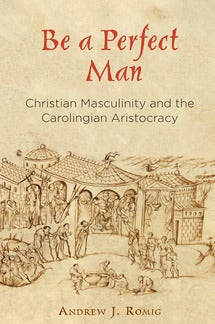Andrew J. Romig is a professor of European medieval studies, specializing in the transformations of culture and society during the Carolingian late-eighth, ninth, and early-tenth centuries. He has written and taught on such wide-ranging subjects as the history of gender, the history of emotion, medieval Latin and vernacular comparative literature, the history of ethical philosophy and philanthropy, memory, travel and movement, spirituality, historical and literary theory, and the visual arts.
Books
Be a Perfect Man: Christian Masculinity and the Carolingian Aristocracy (University of Pennsylvania Press, 2017)
In Be a Perfect Man, historian Andrew J. Romig argues that discourses of Carolingian masculinity revolved centrally around the performance of caritas, defined by the early medieval scholar Alcuin of York as a complete and all-inclusive love for God and for fellow human beings, flowing from the whole heart, mind, and soul. The authority of the Carolingian man depended not only on his skills in warfare and landholding but also on his performances of empathy, devotion, and asceticism.
